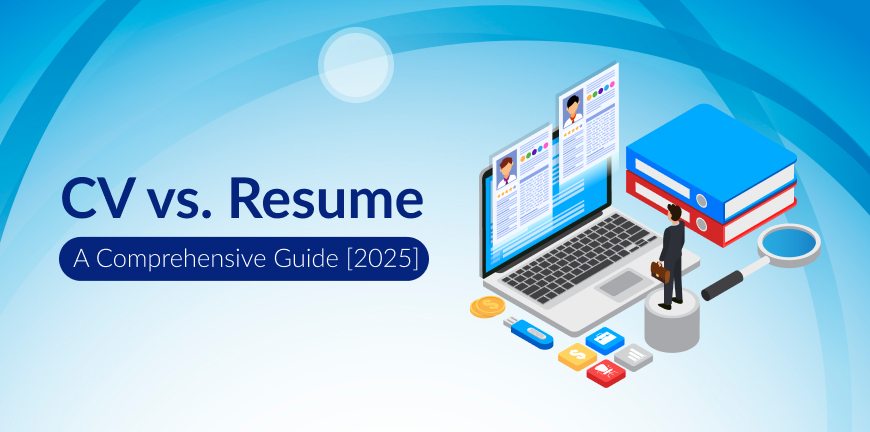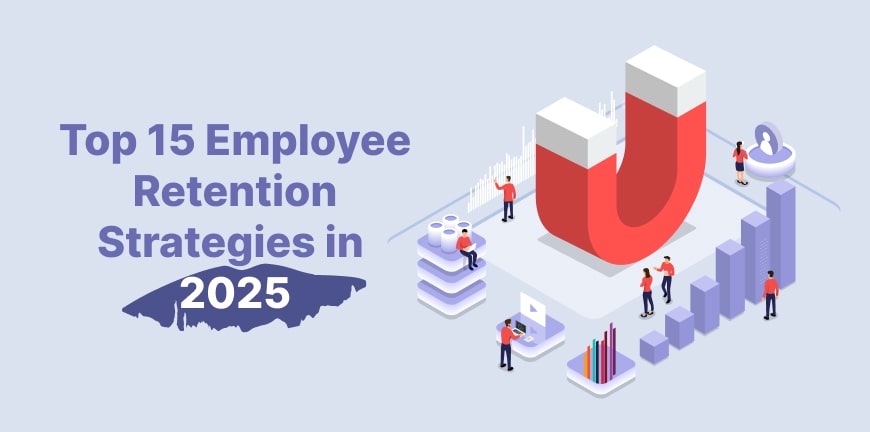
What Is Social Media Recruiting?
21/05/2025
Staff Augmentation vs Professional Services: Key Differences
23/05/2025You must have heard of the terms CV and Resume quite often. Most times the two are used interchangeably. While the two are similar, there are a few differences between the two. And it’s important to understand where to use these documents to get the most out of it. To help you understand the two, in this article we’ll be exploring what exactly is a CV and resume, the difference between CV and resume, which one should you use for applying for jobs.
What is a CV?
A CV (Curriculum Vittae) is a document that includes an individual’s academic history, meaning, educational qualifications and professional employment history comprising of where they have worked previously and their skills and experience. It highlights information like awards, achievements, work experience and research projects. They are used particularly when individuals are applying for academic jobs or jobs that require specialized skills.
What is a Resume?
A resume, a document that all job seekers have and use it as part of their application while applying for a job. It’s a document that includes an individual’s work profile and also mentions the educational qualification. A resume includes your skills, experience as well as your educational qualification. This particular document is used when an individual wants to apply for jobs by highlighting their professional skills and experience and inform the HR why they are right for the role.
CV Vs Resume: Key Differences
Now that we have established what a CV and Resume, let’s take a look at the differences between the two.
| CV | Resume | |
| Length | As many pages as required depending on the experience and details of the same | Must be short and crisp and not exceed more than two pages |
| Detail | Includes details about the entire work history and educational qualifications | Only includes the relevant work experience required for the job. |
| Function | They are mostly used for applying to academic jobs | They are used to apply for jobs where your skills and experience is relevant |
| Customization | Aren’t tailored to specific jobs and includes every experience the individual has gained during their employment. | Is tailored to the specific job that that they are applying for and includes only the required experience for that job. |
| Focus | Prioritizes education, research experience and publications | Highlights work experience, professional achievements, and skills. |
| References | References from professionals are recommended to include | Need not list references unless specifically asked by the employer |
| Format | They are mostly academic and follow the same format | Different resume formats to choose from |
| Keywords usage | Includes field-specific terminology and less focussed in incorporating keywords | Incorporate industry specific keywords to catch the attention of hiring managers. |
| Personal information | It doesn’t have to include information like age, gender, ethnicity and more | Some countries expect individuals to include personal information. |
When Should You Use a CV vs Resume?
There are a few things you must consider before using either a CV or resume. To help understand which document will serve you the purpose, here are a few tips-
1. Consider the Job and Industry
Do thorough research about the standard practices being followed in the industry you are looking to apply for. Fields like academia or research, meaning if you are applying for the position of a researcher, or professor, they would prefer CVs. Corporates, startups, and other industries prefer to look at resumes.
2. Check job descriptions properly
Read the job descriptions properly as to what the job role requires. Take a look at the nature of the job, company requirements and other specific details. This must give you an idea of whether you need to submit you CV or resume. Some companies ask for both, while some ask only for a resume.
3. Assess your experience
Make sure to assess your work experience as well as educational qualifications, meaning, whether you are more academically inclined or have more relevant skills and experience required to work in a corporate job. If the latter is true, then a resume will work, for the former, a CV is best.
4. Geographic location
If you are applying for jobs outside your country, research the preferred type of document required in that country. Some countries like USA and UK prefer CVs whereas countries like Asia, Africa prefer resumes.
5. Consider the company culture
Corporates and Startups prefer shorter, crisp documents like a resume, whereas academically inclined companies like educational institutions or research institutions will prefer a CV.
2025 Trends in CVs and Resumes
In today’s date everybody is looking for minimalist designs, ATS optimization and other achievements. Highlighting the most relevant and useful information with respect to academic history and employment history is what is most preferred.
1. Minimalist designs
Whether it’s a CV or a Resume, your document must be easy to read and understand. Writing clear heading and putting the information in the form of bullet points is preferred for both recruiters as well as ATS.
2. Personal Branding
Your document must reflect exactly who you are how your academic background/skills/experience is relevant to the company you are applying for.
3. Quantifiable Achievements
Instead of going on and on for paragraphs together about stating vague responsibilities, individuals must focus on putting up measurable success.
4. Emphasis on Continuous Learning:
Showcasing certifications, courses, and other learning experiences demonstrates your commitment to staying up to date in your field.
5. Personalization
Nobody wants to go through an overly lengthy document to know and understand who you are and what you have done. Companies prefer if you highlight your major achievements, important skills, research papers, publications etc.
6. Emphasis on technical proficiency and digital skills
It’s the digital age, and it’s important that candidates highlight their knowledge in the technical fields and well as digital skills.
Common Mistakes to Avoid in a CV and Resume
When you are applying for a job either through a CV or resume, there are some common mistakes to avoid-
1. Proofread it
Make sure to recheck what you have on your CV or resume before submitting it, as it shouldn’t have spelling mistakes, typos, or other errors. Having these is a sign of unprofessionalism.
2. Irrelevant information
Do not bore the organization with information that is not of use to them like marital status or hobbies. Only put the most relevant information
3. Focusing on KRAs rather than achievement
While it is important to state the details of your duties, it’s also important to highlight your achievements.
4. Not tailoring to the job
Customize your resume for each job application, highlighting the skills and experience that are most relevant.
5. Do not use phrases over and over
Whether it’s a CV or a resume, make sure to not use phrases over and over again without backing it up with the right data.
6. Not including keywords
Most companies these days use the ATS tool to scan the documents, so it’s important to include keywords. Not using keywords can make your document irrelevant to the recruiter.
FAQs- Frequently Asked Questions
1. What is the main difference between a CV and Resume?
A resume is what a potential employer glances to understand your work experience and how your skills are right for the role you have applied for, whereas a CV is a much more detailed document that includes everything right from your educational background, employment history, research etc.
2. Can I use the same CV for every application?
Using a generic or the same CV for every application is not a clever idea. Of course, you must include each and every information about your educational background, employment history, skills and so on. But it’s also important to tailor your CV in places to highlight the things the employer is interested in.
3. How long should a resume be in 2025?
A resume should only be one page for most candidates. It’s important to be brief on your resume. Only include the most relevant experience have and highlight the ones that are most in line with the job role you are applying for.
4. Is a CV or resume better for freshers?
Resumes can be used for all companies and to apply for various positions across all levels in most industries whereas a CV works well only for academic, scientific or research purposes. So, for freshers, depending on what they are looking to work as and who they are looking to work for, either can be used.
5. Can a resume be 3 pages?
A resume is a document that the recruiter browses for just a few seconds before he moves on to the next which is why it’s best to keep your resume to one, or at the most two pages.
Contact Us For Business Enquiry

Rajkumar Shanmugam
Rajkumar Shanmugam is the Head of HR at ALP Consulting, bringing over 19 years of comprehensive HR leadership experience across India and international markets. His expertise spans talent acquisition, employee relations, performance management, compliance, and HR transformation. Rajkumar has a proven track record of driving people-centric initiatives, enhancing workplace culture, and aligning HR strategy with business goals. With extensive experience in US staffing operations and global mobility, he continues to lead organizational excellence through innovation and employee engagement.




